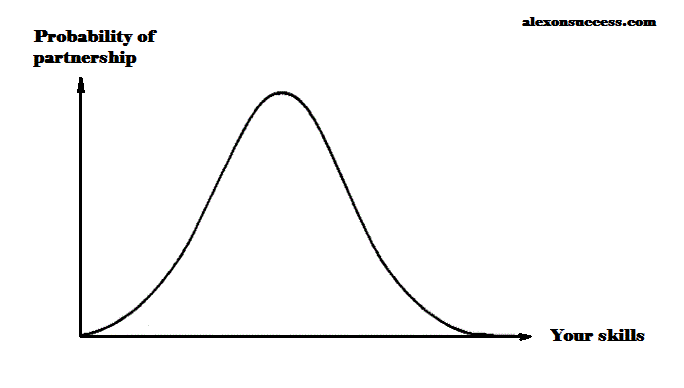Partnership in Business. Part 2 – Right questions

This is the 2nd article in the series of articles about partnerships in business. In the first one we got rid of basic delusions and assessed our chances to find a good partner. The rest will be dedicated to:
- who you should consider as a partner (including where to find them);
- who to avoid;
- questions to ask before you decide.
And maybe I will put a carriage before a horse, but I will start with the questions you should ask your potential partner before shaking hands. I cannot state that it is a complete questionnaire, but all the questions here are based on my own experience.
Question I: % of ownership.
Well, this question is unavoidable. But never have 50/50 ownership. Even though, this may be absolutely legal in your jurisdiction, but such partnership is doomed to be unsuccessful or at least to face significant problems. Avoid having such a ticking time bomb under your business.
Question II: What you bring into and how to measure
Discuss, what each of you are going to bring into business. And, even more important, HOW to measure that? You don’t what to end up with a partner who is theoretically responsible for marketing, but all what he does is posting a single Facebook post once a month. And, of course, I’m not talking about an influencer with a gazillion of followers. I’m talking about an ordinary lazybones.
Also, you should be acutely conscious of the equality in your partnership. I mean you should have no delusions  about whose position is stronger. For example, you plan to create a business in a realm, which is totally new for you. You find someone who is knowledgeable about the realm. His experience and your money should work together. Your position is stronger, right? Absolutely, till the moment you started a business, you have a freedom to pickup any specialist in the realm you like. But what happens when you already invested your money? Now you have no freedom plus now you have to blindly trust your partner. Still believe that your position is stronger?
about whose position is stronger. For example, you plan to create a business in a realm, which is totally new for you. You find someone who is knowledgeable about the realm. His experience and your money should work together. Your position is stronger, right? Absolutely, till the moment you started a business, you have a freedom to pickup any specialist in the realm you like. But what happens when you already invested your money? Now you have no freedom plus now you have to blindly trust your partner. Still believe that your position is stronger?
Question III: Compare your goals in business
 Compare your goals in business and seriousness of intentions. For example, your goal in business is to prove that you are a real businessman (by creating a viable business and helping out thousands of your clients) and you decided that you are going to achieve that at any cost. Would you like a partner whose only dream is BMW M6 and he strongly believes that business is quick and easy way to achieving this goal?
Compare your goals in business and seriousness of intentions. For example, your goal in business is to prove that you are a real businessman (by creating a viable business and helping out thousands of your clients) and you decided that you are going to achieve that at any cost. Would you like a partner whose only dream is BMW M6 and he strongly believes that business is quick and easy way to achieving this goal?
Question IV: How you formulate your dream
How you formulate your dream: to rather give something to others or rather to get something for yourself? We will discuss this later in more details in the following articles. But such a difference is a fundamental one: to give is more about hero or a leader, to get – more about parasitizing. Trust me, these two types cannot go together for a long time. And yes, I understand that nobody has just one pure form of motivation, we all typically combine to-get with to-give, but you always can identify the foremost one.
Question V: How long are you able to work?
How long are you able to work even if you see no result. How many iterations you are going to take? We all know that typically a real time to implement a brand new (when nobody had such an experience before) project is at least 3  times longer than your plan. But in our first startups we never really take this into a account. Discuss this with your partner, especially if the project is quite long. Do you really have resources, stamina and firm desire to complete the endevour even if it takes 3 times longer? What if you complete the project, but will not see any significant result? Say, you planned to work for 6 month to develop a revolutionary product. It took you a year (which is super fast in comparison to average). Finally you completed the development and your product is released. And voila! Nothing happens. In theory we all say that we will switch to plan B. In reality, the only plan you really had was: I release a product, it gives me tons of cash, I go to a dealership and buy a Bentley. Plan B? Sure, if I can’t afford a Bentley, I will buy a Maserati… And de-facto you are not ready for a plan B.
times longer than your plan. But in our first startups we never really take this into a account. Discuss this with your partner, especially if the project is quite long. Do you really have resources, stamina and firm desire to complete the endevour even if it takes 3 times longer? What if you complete the project, but will not see any significant result? Say, you planned to work for 6 month to develop a revolutionary product. It took you a year (which is super fast in comparison to average). Finally you completed the development and your product is released. And voila! Nothing happens. In theory we all say that we will switch to plan B. In reality, the only plan you really had was: I release a product, it gives me tons of cash, I go to a dealership and buy a Bentley. Plan B? Sure, if I can’t afford a Bentley, I will buy a Maserati… And de-facto you are not ready for a plan B.
 Let’s assume that you are down but not out. You take a pause and compose a plan B. Now you are smarter and your iterations are way shorter. And you completed an iteration B (according to your plan B). And then iteration C and D. But still no significant result. How long will you be able to continue? How many iterations would you promise to your partner to partake?
Let’s assume that you are down but not out. You take a pause and compose a plan B. Now you are smarter and your iterations are way shorter. And you completed an iteration B (according to your plan B). And then iteration C and D. But still no significant result. How long will you be able to continue? How many iterations would you promise to your partner to partake?
If you think that these questions are not applicable to you because you have got a brilliant business idea… Oh well! Please try to prove your point in practice. And I will keep my fingers crossed for you. Unfortunately, statistics is at my side: in 99% of cases you will have to come back and re-read this article…
Question VI: Money Expectations.
For a first attempt, what is your money expectations? It is not very important question, but knowing that will help you to understand your partner better and even to predict his or her future actions as soon as you get first results.
Question VII: How you are going to spend profits?
What are you going to do with profits: to blow the money or to reinvest into business? You and your partner should be on the same page. Otherwise, one of you reinvests money and develops future growth while another one just enjoys higher profits without equal participation. This may become a very valid background to part.
Question VIII: How to split?
What if you loose interest to work, say, 2 years from now? What we are going to do? How to decide how to split the business in such circumstances and so on. I faced such a situation and, fortunately, I didn’t have any problems in handling it, but potentially could: I missed to ask this right from the very beginning. It is a very uncomfortable topic (since it looks like you suspect that your partner is a potential schlepp), but you have to ask all this. Be gentle and very polite, say “one of us” rather than “you” when discussing. But woe is you if you feel too embarassed to ask…
Question IX: Other conditions for a partner to exit
The previous question tackles just one foremost case of a partner exiting a startup. There is a bunch of others: upon disability, upon death, upon sale etc. You don’t want to get a sudden message from your partner like “I decided to  quickly sell my share of our business. If you don’t buy within one week, I’m going to sell to other people…”
quickly sell my share of our business. If you don’t buy within one week, I’m going to sell to other people…”
To mitigate such risks and to avoid such difficulties you should apply to an experienced lawyer. Expensive? Yes! But in many cases when you part with people (especially when you already have what to share), you will face conflicts about what was not discussed. Maybe today it is too expensive and does not make any sense, but as soon as the assets of your company reach a certain threshold, you should compose an appropriate buy-sell agreement.
Question X: How to measure the performance?
How to divide business if partnership is not fair enough. An example from real life: you ask your partner to complete a task which is crucially important and takes an hour. Your partner disregards your request for two weeks. This  repeats over and over again till the last straw breaks the camel’s back. And in response to the rebuke he or she says: “Oh, I never thought that it is so important to you!” Here I will omit what you think and say in return, it is obvious that such partnership cannot last long.
repeats over and over again till the last straw breaks the camel’s back. And in response to the rebuke he or she says: “Oh, I never thought that it is so important to you!” Here I will omit what you think and say in return, it is obvious that such partnership cannot last long.
In order to deal with the situation like this effectively, you should have discussed how to measure the performance of each partner. What is an acceptable response time. What to do next in such a situation – either shut down the company or buy-sell shares. All this must be discussed right at the very beginning.
Question XI: Ask about previous failures
If your potential partner has failed in the past, ask why. If his answers do not satisfy you, better avoid partnership. For example, if his answer is about bad market conditions or incorrect people, highly likely his infantilism will ruin your mutual business. But even if you are satisfied with the answers, this does not guarantee success.
Question XII: Compare notes about future.
Compare thoughts about growth of business, scaling, delegating, management etc. A consensus here is nice to have, and issues here should not stop you. You will have a lot of time to reconcile these thoughts down the road. But if you disregard all these items, they can potentially slow down your business and may beget lots of smaller problems.
Bad news, even though you and your partner are on the same page about everything, this does not guarantee any success. It is like two artists who belong to the same school and have similar technique and so on. This doesn’t mean that these two artists will be able to create a masterpiece together…
Question XIII: Big goals vs trifles.
Everybody dreams about big goals. But ask yourself and your partner if you are ready to make smaller, way less heroic deeds day in day out to reach those big goals. If the answer is no, your business is doomed to fail. A partner who doesn’t want to squander his gifts on trifles will become a huge dragging chute for your business. I’m not a great fan of bombastic quotes, but this one suits here:
Success is the sum of small efforts – repeated day in and day out. (Robert Collier)
So, if you believe that Robert Collier was right, steer clear of such “big dreamers” who don’t want to start with what they have. In my opinion, this is just a mask of procrastination.

Enough questions. Test!
There are mockingbirds who will be able to answer what you expect to hear. Moreover, there are some people who are able to deceive even themselves. And you will automatically be deceived by them. So, do not expect too much from such an interview. But there is an ultimate way of checking. Before starting any significant business, test your partner in a smaller and less significant affair. This will give way more information. This may unveil a lot of secrets. And keep your eyes open to see any discrepancies between the answers and his (her) real actions.
Instead of a summary
It is hard to sum up the article which is already a summarization itself. But the key points are:
- Don’t be delusional
- Trust but check
- Test your partner on a minor, but real affair
And the last but the least, if you can afford, better use the services of an experienced facilitator – such a help can be priceless.
This was the Part 2 of Partnership in business series of articles. The first one is Partnership In Business. Part 1 – Your Chances.
 thing, and then may feel very disappointed when this setting of our world-view collides with the reality!
thing, and then may feel very disappointed when this setting of our world-view collides with the reality! too much. In fact, you are pedaling singlehandedly, say, 70% of time. Carrying double weight, of course. Do you still think that such a partnership is beneficial for you?
too much. In fact, you are pedaling singlehandedly, say, 70% of time. Carrying double weight, of course. Do you still think that such a partnership is beneficial for you?

 example. I know it is a thankless job because here we refer to rather myths and legends, but nevertheless. Do you think Steve Jobs had really equal partners? I ask about the last couple of decades. Not about the very beginning, when Steve Wozniak was such a partner, but about the Pixar-and-later times. Can you name anybody? I disbelieve that, and the reason being: Steve Jobs became such an utmost entrepreneur, that it was almost impossible for him (and even not needed) to find anybody comparable to him. Moreover, other business gurus, comparable to him, they run their own very successful businesses. In truth, after you reached quite high level of entrepreneurship, it becomes like among the immortals: “There can be only one”.
example. I know it is a thankless job because here we refer to rather myths and legends, but nevertheless. Do you think Steve Jobs had really equal partners? I ask about the last couple of decades. Not about the very beginning, when Steve Wozniak was such a partner, but about the Pixar-and-later times. Can you name anybody? I disbelieve that, and the reason being: Steve Jobs became such an utmost entrepreneur, that it was almost impossible for him (and even not needed) to find anybody comparable to him. Moreover, other business gurus, comparable to him, they run their own very successful businesses. In truth, after you reached quite high level of entrepreneurship, it becomes like among the immortals: “There can be only one”.